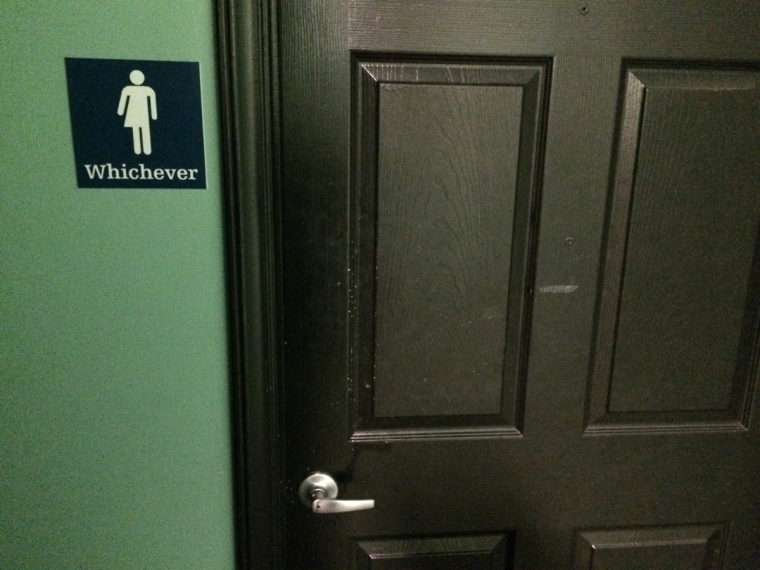BREAKING: ACLU piles on N.C. over transgender 'restroom law'; anything, or anyone goes

RALEIGH, N.C. (Christian Examiner) — The American Civil Liberties Union, the ACLU of North Carolina, and Lambda Legal – an organization dedicated to advancing the gay, lesbian and transgender agenda – filed a lawsuit in U.S. District Court today asking the court to squash North Carolina's new "restroom law," known as House Bill 2.
Passed last month, HB2 prohibits those biologically male from using multi-occupancy women's restrooms and those biologically female from using multi-occupancy restrooms in government buildings (such as universities).
Gov. Pat McCrory has said the bill enhances public safety and also ensures that local governments cannot create laws unsupported by or contradictory to state law.
The ACLU, however, claims the law "targets transgender people for discrimination in single-sex facilities."
Medical science is clear that it is inappropriate to use chromosomes, hormones, internal reproductive organs, external genitalia, or secondary sex characteristics to override gender identity for purposes of classifying someone as male or female.
"HB 2 is causing ongoing and serious harm to transgender people in North Carolina and must be put on hold while it is reviewed by the court," said Chris Brook, legal director of the ACLU of North Carolina, said.
"The Justice Department has made it clear that HB 2 violates federal law. Gov. McCrory and the North Carolina Legislature wrote into state law discrimination against transgender people who just want to be able to use public facilities safely and securely."
The U.S. Justice Department notified North Carolina in a letter last week that the governor had to either alter the legislation significantly or do away with it or risk the loss of federal funding.
That is not, of course, how the making and enforcing of state law works. A governor cannot alter law or suspend a law duly created by the legislature.
McCrory in return sued the federal government, claiming it has no right to impose its will on the State of North Carolina on items such as public restroom ordinances. He asked the court for a declaratory judgment on whether or not the law was constitutional.
"The Obama administration is bypassing Congress by attempting to rewrite the law and set restroom policies for public and private employers across the country, not just North Carolina. This is now a national issue that applies to every state and it needs to be resolved at the federal level," McCrory said.
"They are now telling every government agency and every company that employs more than 15 people that men should be allowed to use a women's locker room, restroom or shower facility."
The governor's lawsuit was followed almost immediately by a lawsuit against the state by the U.S. Justice Department. Then came President Obama's "guidance" for school districts – which carried the imprimatur of an executive order mandating that students should be allowed to use the restroom for the gender with which they identify.
Gov. McCrory called the instructions "a massive executive branch overreach, which clearly oversteps constitutional authority."
"Both non-discrimination and privacy are basic tenets of our great country. States and local governments cannot have a myriad of different laws which cause confusion and inconsistent application," McCrory said. "However, the executive branch of the federal government does not have the authority to be the final arbiter."
The ACLU has sided with the federal government in the case to push the rights of transgenders, the latest iteration of the LGBT "human rights" crisis. It claims in the lawsuit that three transgenders have been "singled out for differential treatment by provisions of H.B. 2 that restrict access to single sex facilities, such as restrooms and locker rooms, based on the gender marker on one's birth certificate."
The new law, the filing claims, has caused the three – suffering from the mental disorder known as "gender dysphoria" – to experience "significant mental and emotional distress."
The filing also claims that gender identity, or a "person's core sense of belonging to a particular gender," is "fixed at a young age and cannot be changed."
Finally, the lawsuit offers up "medical science" to add weight to its claim that transgenders should have access to the bathroom of their choice.
"Medical science is clear that it is inappropriate to use chromosomes, hormones, internal reproductive organs, external genitalia, or secondary sex characteristics to override gender identity for purposes of classifying someone as male or female," the lawsuit said.
That is to say, according to the ACLU, all external and internal objective evidence about biological sex does not outweigh an individual's belief or feelings about gender identity.
Kyle Palazzolo, a staff attorney with Lamba Legal, said the transgenders forced to use the restroom conflicting with their gender identity are suffering "irreparable harm."
"As Attorney General Lynch said this week, 'none of us can stand by when a state enters the business of legislating identity and insists that a person pretend to be something they are not, or invents a problem that doesn't exist as a pretext for discrimination and harassment,' and we couldn't agree more," Palazzolo said.
Gov. McCrory maintains that the problem is one created by Washington and a president who is unaware of his constitutional role. The recent statement on public schools is a prime example, he said.
"President Obama's administration has instituted federally mandated edicts that affect employees as well as every parent and child within a public school system. This national bathroom, locker room and shower policy for almost every business, university and now K-12 school in our country changes generations of gender etiquette and privacy norms which parents, children and employees have expected in the most personal and private settings of their everyday lives," McCrory said.
"Most Americans, including this governor, believe that government is searching for a solution to a problem that has yet to be defined."